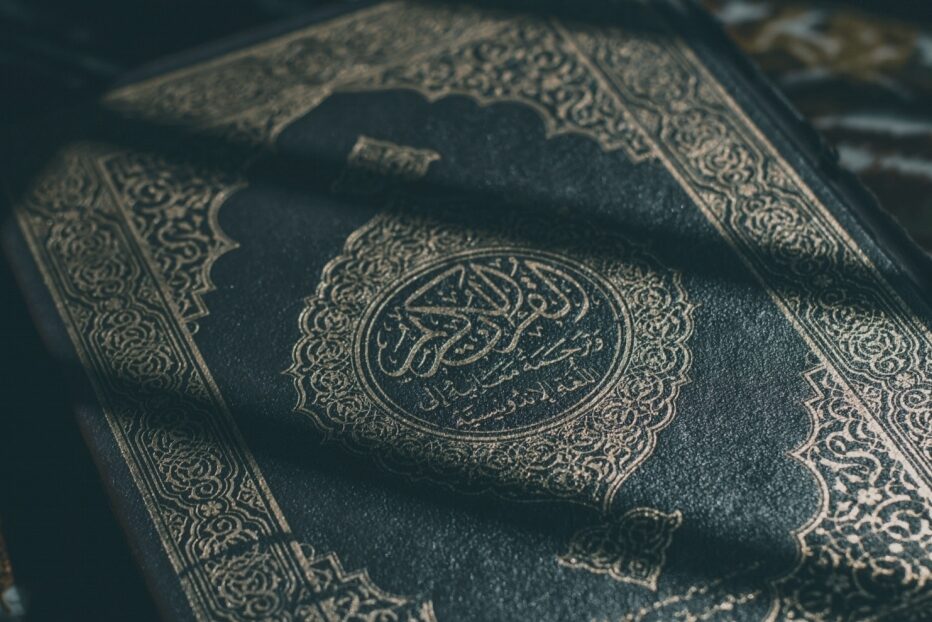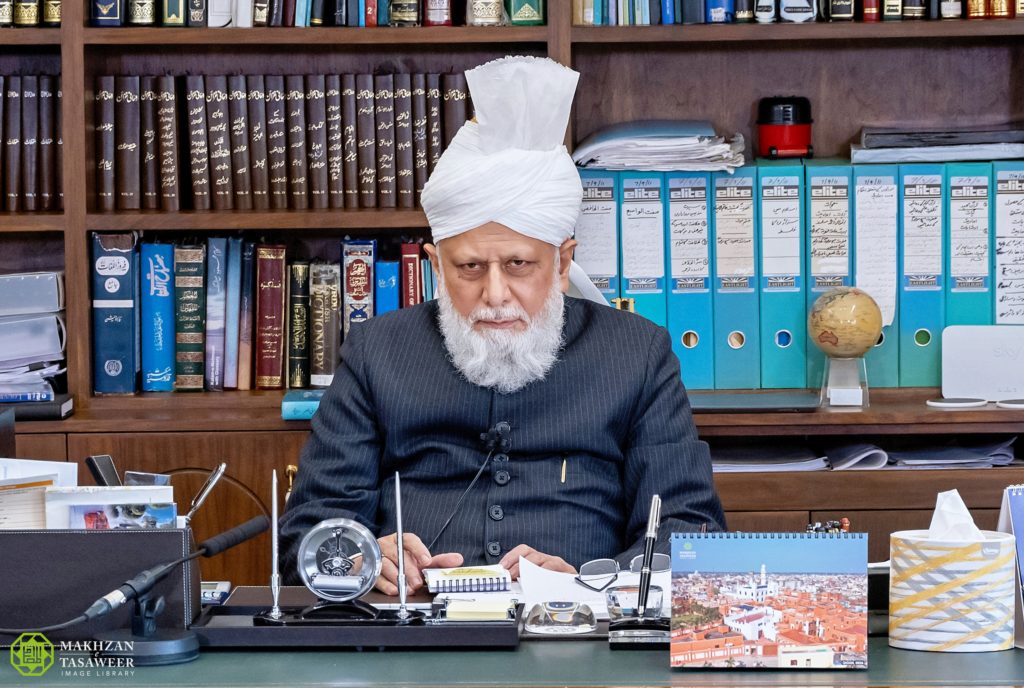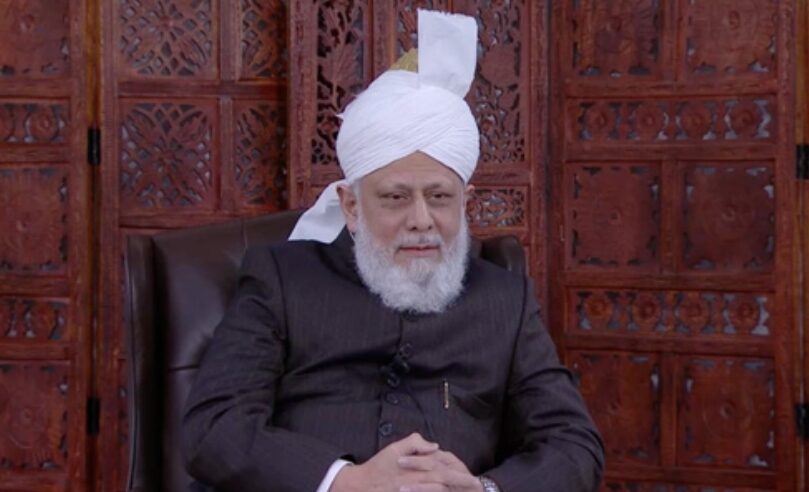Guidance regarding basic Islamic issues that Hazrat Amirul Momineen, Khalifatul Masih Vaa has given at various occasions in his written correspondence and during various MTA programmes is being officially published below for everyone’s benefit
Zaheer Ahmad Khan, Records Department, Private Secretariat, London
Reciting the Holy Quran during menstruation

Someone presented research to Hazrat Amirul Momineenaa, comprising of quotations of various experts of jurisprudence (fiqh) and other scholars, with regard to holding the written copy of the Holy Quran and reciting from it or from computers, iPads and other electronic devices during menstruation. The person requested Huzooraa to provide guidance on the issue.
Huzooraa, in his letter dated 5 October 2018, gave the following reply:
“There is a difference of opinion regarding this matter among fuqaha [jurists] and other scholars. Esteemed elders of the faith have also expressed various opinions regarding this matter based on their understanding of the Quran.
“In light of the Holy Quran, the ahadith of the Holy Prophetsa and the sayings of the Promised Messiahas, my stance on this matter is that during menstruation, a woman can repeat the previously memorised portions of the Holy Quran by way of zikr [i.e. remembrance and reflection in her heart].
“Moreover, if necessary, she can also hold the Holy Quran using a clean piece of cloth and can read out a portion of the Holy Quran in order to provide someone a reference or to teach the Holy Quran to children. However, she cannot recite it in the regular manner.
“Likewise, she is not allowed to recite the Holy Quran regularly during menstruation using computers etc. even though she would not be physically holding the Holy Quran. However, she can read the Holy Quran on computers etc., for instance, to search for a reference or to provide someone with a reference. There is no issue with that.”
Entering or attending a mosque during menstruation
A lady sent a note to Huzoor-e-Anwaraa, referencing various ahadith with regard to the issue of ladies attending [prayer rooms of] mosques during menstruation while mentioning the availability of modern female hygiene products. She asked about the permissibility of menstruating women attending Jamaat meetings that are held in mosques and about giving menstruating non-Muslim female guests a tour of the mosque and requested Huzooraa to provide guidance.
Upon this, Huzooraa, in his letter dated 14 May 2020, gave the following answer:
“The Holy Prophetsa has clearly elucidated the separate instructions regarding menstruating women fetching something from the mosque, bringing something to the mosque and sitting in the mosque. Hence, as you have mentioned in your letter, the Holy Prophetsa would allow his wives, who were menstruating, to lay out the mats in the mosque for example. However, as far as sitting in the mosque during menstruation is concerned, the Holy Prophetsa has very clearly prohibited that in ahadith.
“Hence, at the occasion of both the Eids, the Holy Prophetsa would emphatically instruct unmarried girls, young women observing purdah and the menstruating women – all of them – to attend the Eid prayers, so much so that he instructed women, who did not have scarves readily available, to borrow them from their sisters to attend the Eid prayers. However, he also instructed menstruating women to participate in the supplications [before or after Eid Salat] while staying out of the prayer room.
“Likewise, at the occasion of Hijjatul Wada‘ [the Farewell Pilgrimage] while other Muslims were performing Hajj prior to Umrah, Hazrat Aishara was menstruating. Therefore, the Holy Prophetsa did not allow her to perform Umrah for one is required to spend considerable time in the mosque to perform the tawaf i.e circling the Ka‘bah. When, after the Hajj, her menstruation had finished, he sent her separately to perform the Umrah.
“Thus, after such clear guidance contained in ahadith, there should be no reason left for us to find ever new ways to fulfil our own desires.
“As far as this aspect is concerned, that women did not have the means of hygiene that are available to them today, it is correct that they did not have such modern means. However, this does not mean that they could not take care of their hygiene at all and that their outer garments were soiled from the menses. Mankind has tried to find better arrangements to fulfil its needs in every era. Thus, women used to look after their hygiene in the best possible way in the past as well.
“Moreover, there are definitely some flaws even in the modern-day hygiene products. Such women who bleed heavily, their clothes sometimes get spoiled due to leaking pads.
“Thus, such teachings of Islam will be acted upon in every era that are everlasting and equally applicable for all times, just like they were acted upon during the time of the Holy Prophetsa.
“If there are constraints somewhere to the effect that there is no other space available apart from the prayer room, then one can designate a space at the end of that room, next to the door where one usually does not pray. Menstruating women can sit there. Otherwise, chairs can be arranged for such women at the end of the prayer area so that there is not even a slight possibility of the prayer area being spoiled.
“As far as non-Muslim female visitors to the mosque are concerned, firstly, they are usually not seated in the mosque; rather, a walking tour of the mosque is provided to them, the duration of which is equivalent to the time it takes to bring a mat from the mosque or lay out a mat there [as mentioned in the hadith above]. However, if it becomes necessary to seat them in the prayer area, you should seat them on chairs towards the end of the mosque instead of seating them on the prayer mats in the prayer area.”
In the above reply, the emphatic instruction of the Holy Prophetsa to menstruating women to join in the supplication at the occasion of Eid has been mentioned.
In reply to a related question regarding listening to the Eid sermon, Huzooraa gave an answer in light of a hadith of the Holy Prophetsa which is presented below for everyone’s benefit:
Permissibility of missing the Eid sermon

A person asked about a hadith of Sunan al-Daraqutni wherein the Holy Prophetsa said after the Eid prayer that he was going to deliver the Eid sermon. The Prophetsa said that whoever wished to stay, could stay and whoever wished to leave, could leave. The person asked whether this hadith was correct.
Upon this, Huzoor-e-Anwaraa, in his letter dated 20 October 2020, granted the following reply:
“The hadith regarding leave from the Eid sermon that you have mentioned in your letter with reference to Daraqutni has also been narrated in Sunan Abi Daud.
“It is correct that the Holy Prophetsa has not emphasised the listening of the Eid sermon as much as he has emphasised the attending of the Friday sermon and listening to it with complete silence. Based on this, fuqaha and other scholars have declared the Eid sermon a sunnah and mustahab [i.e. a desired action as practiced by the Holy Prophetsa].
“However, alongside this, one should also remember that the Holy Prophetsa has declared the attending of the Eid prayers and joining in the supplications of the Muslims, a blessed act of virtue. He emphasised it to the extent that he instructed that a woman who does not have her own scarf, should borrow it from one of her sisters to attend the Eid prayers. Moreover, he emphasised attending the Eid prayer for menstruating women with the instruction that they should join in the dua while staying out of the prayer area.”

Etikaf at home
A lady asked the following question about etikaf which is done during the month of Ramadan:
“Is it allowed to perform [the Ramadan] etikaf at home and can its duration be three days?”
In his letter dated 9 August 2015, Huzooraa gave the following answer to this issue:
“As far as the masnun etikaf [according to the practice of the Prophetsa] is concerned, which is performed during Ramadan, it is proven from the Holy Quran and hadith that it cannot be performed at home for three days.
“It is evident from the practice of the Holy Prophetsa that he used to perform etikaf during Ramadan in the mosque for at least ten days. Hence, the following is mentioned in a hadith:
عَنْ عَائِشَةَ رَضِیَ اللّٰهُ عَنْهَا زَوْجِ النَّبِیِّ صَلَّى اللّٰهُ عَلَيْهِ وَسَلَّمَ أَنَّ النَّبِیَّ صَلَّى اللّٰهُ عَلَيْهِ وَسَلَّمَ كَانَ يَعْتَكُِفُ الْعَشْرَ الْأَوَاخِرَ مِنْ رَمَضَانَ حَتَّى تَوَفَّاهُ اللّٰهُ
“‘The Holy Prophetsa used to perform etikaf in the last ten days of Ramadan till he passed away.’ [Sahih al-Bukhari, Kitab-ul-Etikaf, Bab al-Etikafi fil-Ashril-Awakhiri wal-etikafi fil masajidi kullihaa]
“Likewise, in the Holy Quran, where Allah the Exalted has mentioned matters related to Ramadan, there He has also given commandments regarding etikaf. He says:
وَلَا تُبَاشِرُوْهُنَّ وَأَنْتُمْ عَاكِفُوْنَ فِی الْمَسَاجِدِ
“That is, firstly, any conjugal relationship between a husband and a wife is not permitted during etikaf in Ramadan and secondly, mosques are the places designated for etikaf. [Surah al-Baqrah, Ch.2: V.188]
“We also find further explanation of this issue in ahadith that the etikaf of Ramadan can only take place in a mosque. Hence, Hazrat Aishara narrates:
السُّنَّةُ عَلَى الْمُعْتَكِفِ أَنْ لَا يَعُوْدَ مَرِيْضًا وَلَا يَشْهَدَ جَنَازَةً وَلَا يَمَسَّ امْرَأَةً وَلَا يُبَاشِرَهَا وَلَا يَخْرُجَ لِحَاجَةٍ إِلَّا لِمَا لَا بُدَّ مِنْهُ وَلَا اعْتِكَافَ إِلَّا بِصَوْمٍ وَلَا اعْتِكَافَ إِلَّا فِیْ مَسْجِدٍ جَامِعٍ
“‘The sunnah for one who is observing etikaf is not to visit a patient, not to attend a funeral, not to touch his wife or have conjugal relationships with her, not to go out of the mosque for anything except for the most necessary reasons that cannot be avoided. There is no etikaf without fasting and there is no etikaf except in a congregational mosque.’ [Sunan Abi Daud, Kitab al-Siyam, Bab al-Mu‘takifi ya‘ood-ul-mareeda]
“Thus, according to the Holy Quran and ahadith of the Holy Prophetsa, the masnun etikaf of Ramadan, as practiced by the Holy Prophetsa, is the one that is observed for at least ten days in a mosque.

“Nevertheless, if anyone wishes to seclude themselves in devotion at home for some days other than the days of Ramadan as a good deed and to seek spiritual reward [sawab], then they are permitted to do so and we find no prohibition thereof mentioned anywhere. Moreover, some fuqaha have deemed it better for women to observe etikaf at home. Hence, it is stated in Hidayah, a famous book of Islamic jurisprudence:
اما المرأۃ تعتکف فی مسجد بیتھا
“That is, ‘Women can observe etikaf in the place at home where they usually offer Salat.’ [Al-Hidayah fi Sharhi Bidayatil-Mubtadi, Bab al-Etikaf]
“Hazrat Musleh-e-Maudra stated the following about this matter:
مسجد کے باہر اعتکاف ہو سکتا ہے مگر مسجد والا ثواب نہیں مل سکتا
“‘One may observe etikaf in a place other than the mosque, but they cannot earn the sawab that is earned in the mosque.’” [Al Fazl, 6 March 1996]
The age of wearing a scarf
During Gulshan-e-Waqf-e-Nau, which was recorded on 12 October 2013 in Australia, a girl asked Huzooraa regarding the age at which girls should start wearing a scarf. In reply to this question, Huzooraa said:
“When you reach the age of five, you should not go out without wearing leggings under your frock. Your legs should be covered so that you develop the feeling that gradually your dress must become modest. You should not wear a sleeveless frock.
“Then, when you turn six or seven, you should become even more careful with regard to your leggings. And when you turn 10, you should try to develop the habit of wearing some sort of scarf.
“When you turn 11, you should wear your scarf properly. There should be no issue with wearing a scarf. Even the indigenous people here wear scarves during the winter. Don’t they cover their ears due to the cold? That is just a scarf. Wear scarves like that.
“Some girls appear really young even when they have reached the age of 10. Others look like they are 12-year-old girls, although they may still be 10. They may appear older due to their height. So, every girl should see that if she looks older, then she should wear a scarf.
“If you develop the habit of wearing a scarf at a young age, then you will not be ashamed of it. Otherwise, you will continue being ashamed all your life. If you say that you will wear a scarf when you turn 12, 13 or 14 , then this mind-set will stay and will be completely held off due to being embarrassed. You will say, ‘Oh no, the other girls are going to mock me. If I wear the scarf, they are going to laugh at me.’
“Hence, try to develop the habit of wearing the scarf sometimes. Start wearing the scarf when you are seven, eight or nine and also wear it in front of other girls so that you do not feel embarrassed anymore. And when you start to appear older, then wear the full scarf properly. Alright? Have you understood?
“This much is enough for you. As for the older girls, it is necessary for them that they also understand that the essence and the main purpose of [purdah] is modesty. And those who come under Western or European influence [should know that] in the olden days, even these people wore dresses that were this long. [Here, Huzooraa indicated the length of the dresses with his hands.] They used to wear long maxi frocks. Now, they walk around uncovered, right?
“The issue is that men are deemed decent and well-dressed when they are clothed in trousers and when they are wearing a coat and a tie. As for women, they are told that they look well-dressed if they wear miniskirts. I do not understand this philosophy.
“So, do not pay attention to men. And [remember] those women who bare themselves, in fact disgrace themselves. Hence, the dignity of an Ahmadi girl and an Ahmadi lady lies in upholding her modesty, for the essence is modesty. It is this modesty which stops others from looking at you with evil intentions.”

When one should observe every compulsory fast
During the same Gulshan-e-Waqf-e-Nau programme, which was recorded on 12 October 2013 in Australia, another girl asked Huzooraa concerning the age at which they should start fasting during Ramadan.
In reply to this question, Huzooraa said:
“Fasting becomes compulsory upon you when you have fully matured. If you are a student and you are sitting your exams and you are 13, 14 or 15 years of age, then you should not fast. If you are able to bear them, then fasting at the age of 15 or 16 is also fine.
“However, usually it is at the age of 17 or 18 that fasting becomes compulsory. One should definitely start fasting thereafter. If you are really fond of it, you can try out one, two, three or four fasts at the age of eight or ten. However, that would not be compulsory.
“Fasting will become compulsory upon you when you grow older and are able to endure the fasts. What is the time difference in the various seasons here [in Australia]? How many hours of daylight do you get? What is the duration between sehri and iftari? 12 hours? And how long is it during summer? Do you fast for 19 hours? Yes, so you cannot stay hungry for 19 hours.
“During the last summer, the fasts in the UK were longer and your fasts were shorter. There, we had 18½-hour fasts. In countries such as Sweden etc., they have 22-hour fasts. Anyway, we have to readjust the timings because one cannot fast for that long. However, the endurance will come once you have become a young adult.
“When you reach the age of at least 17 or 18 years, then it is okay to fast. Then, you should fast. Understood?
“What do your parents say? Do they say that fasting has become compulsory upon you at the age of ten? Anyhow, you should inculcate the habit. Younger children should also keep two or three fasts every Ramadan so that they can experience the arrival of Ramadan. However, even if you decide not to fast, then wake up in the morning and eat sehri along with your parents, offer nawafil [voluntary prayers] and offer the [obligatory] prayers regularly.
“Ramadan for students and girls like you is that you should definitely wake up during Ramadan, eat sehri, make all the arrangements, offer two or four nawafil before that, offer the [obligatory] prayers regularly and recite the Holy Quran regularly.”
(Translated by Aqeel Ahmad Kang, London)


JazakAllah huwa kheran !
Very good advice and clear advice. This has answered many questions regarding women and what must be done at certain times. Thank you for putting it together.
Very good advice and clear advice. This has answered many questions regarding women and what must be done at certain times. Thank you for putting it together. May Allah bless you for the work that you put in. Ameen
Really interesting. MashaAllah